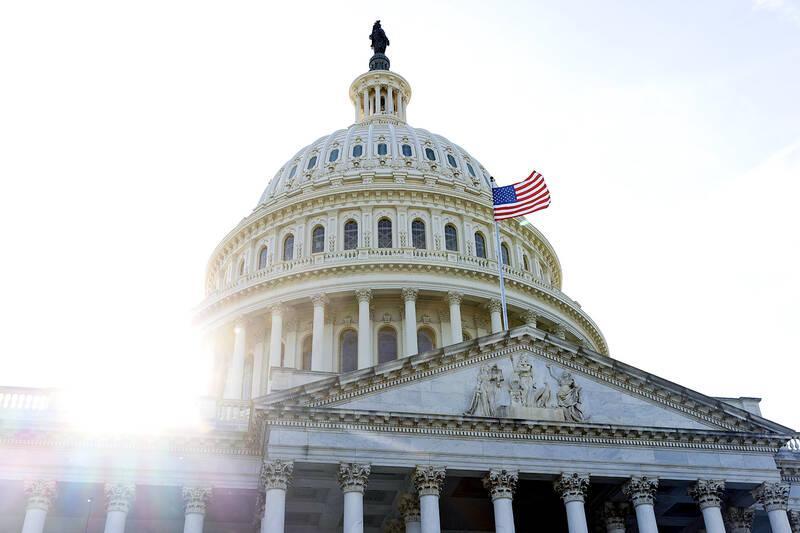US representatives on Tuesday introduced a bill to protect US markets from the economic fallout of a potential Chinese Communist Party (CCP) invasion of Taiwan.
The “Fortifying US Markets from Chinese Military Aggression Act” was introduced by bipartisan members of the US House of Representatives Young Kim, Zach Nunn and Ritchie Torres.
Although the US has longstanding military plans in the event of a CCP invasion of Taiwan, it lacks an “economic game plan,” Nunn said.

Photo: EPA-EFE
The amendment to the Financial Stability Act would create an advisory committee of 12 members, including market makers, asset managers, exchanges and geopolitical experts, to create a coordinated response plan to safeguard the US economy.
The committee would work under the Financial Stability Oversight Council (FSOC) and make recommendations to identify US market vulnerabilities and ensure US capital markets are prepared for potential volatility and disruptions.
The FSOC would then issue annual public reports on the economic risks of a Taiwan conflict.
Bloomberg has estimated that a CCP invasion of Taiwan would cause a global GDP loss of US$10 trillion, double the contraction of the 2008 financial crisis or the COVID-19 pandemic.
As Taiwan produces nearly 90 percent of the world’s advanced semiconductors, economists estimate the US economy would suffer a short-term drop of up to 34 percent, a news release from Kim’s office said.
If the CCP were to take hold of Taiwan’s chip manufacturing capabilities, it would be “devastating, not just for global markets, but for Main Street Iowa businesses,” Nunn said.
“The United States must be proactive in protecting our economy in case of an attack or blockade against Taiwan,” Kim said.
The bill would ensure that US financial markets are not “exploited to strengthen an authoritarian regime that threatens our values and our allies,” Torres said, adding that “American investors should never be in the business of bankrolling the CCP’s military.”
The bill must now pass both the House and the Senate before being signed into law by the US president.

The Coast Guard Administration (CGA) yesterday said it had deployed patrol vessels to expel a China Coast Guard ship and a Chinese fishing boat near Pratas Island (Dongsha Island, 東沙群島) in the South China Sea. The China Coast Guard vessel was 28 nautical miles (52km) northeast of Pratas at 6:15am on Thursday, approaching the island’s restricted waters, which extend 24 nautical miles from its shoreline, the CGA’s Dongsha-Nansha Branch said in a statement. The Tainan, a 2,000-tonne cutter, was deployed by the CGA to shadow the Chinese ship, which left the area at 2:39pm on Friday, the statement said. At 6:31pm on Friday,

The Chinese People’s Liberation Army Navy’s (PLAN) third aircraft carrier, the Fujian, would pose a steep challenge to Taiwan’s ability to defend itself against a full-scale invasion, a defense expert said yesterday. Institute of National Defense and Security Research analyst Chieh Chung (揭仲) made the comment hours after the PLAN confirmed the carrier recently passed through the Taiwan Strait to conduct “scientific research tests and training missions” in the South China Sea. China has two carriers in operation — the Liaoning and the Shandong — with the Fujian undergoing sea trials. Although the PLAN needs time to train the Fujian’s air wing and

Taiwanese celebrities Hank Chen (陳漢典) and Lulu Huang (黃路梓茵) announced yesterday that they are planning to marry. Huang announced and posted photos of their engagement to her social media pages yesterday morning, joking that the pair were not just doing marketing for a new show, but “really getting married.” “We’ve decided to spend all of our future happy and hilarious moments together,” she wrote. The announcement, which was later confirmed by the talent agency they share, appeared to come as a surprise even to those around them, with veteran TV host Jacky Wu (吳宗憲) saying he was “totally taken aback” by the news. Huang,

The American Institute in Taiwan (AIT) put Taiwan in danger, Ma Ying-jeou Foundation director Hsiao Hsu-tsen (蕭旭岑) said yesterday, hours after the de facto US embassy said that Beijing had misinterpreted World War II-era documents to isolate Taiwan. The AIT’s comments harmed the Republic of China’s (ROC) national interests and contradicted a part of the “six assurances” stipulating that the US would not change its official position on Taiwan’s sovereignty, Hsiao said. The “six assurances,” which were given by then-US president Ronald Reagan to Taiwan in 1982, say that Washington would not set a date for ending arm sales to Taiwan, consult